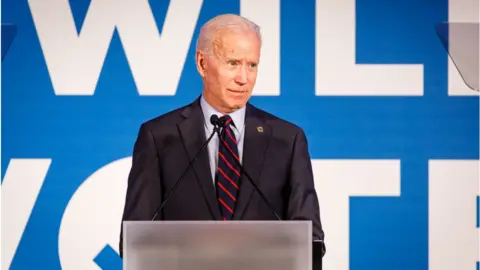Biden reverses stance on abortion funding amid Democratic backlash
 Getty Images
Getty ImagesFormer US Vice-President Joe Biden has reversed his stance on abortion funding amid mounting criticism from his fellow 2020 Democratic rivals.
At a Democratic gala on Thursday, Mr Biden denounced a law which restricts federal abortion funding, saying he believed all healthcare was a right.
The party's current front-runner added that he made "no apologies" for having backed it previously.
Elizabeth Warren and Beto O'Rourke had been the latest to attack his stance.
Mr Biden had long voiced support for the Hyde Amendment - a law passed in 1976, right on the heels of the Roe v Wade Supreme Court ruling that legalised abortion across the US.
His campaign had told NBC News this week he was still in favour of the amendment, triggering a backlash from liberal Democrats.
What is the Hyde Amendment?
In 1976, Henry Hyde, an Illinois Republican congressman, wrote an amendment to a federal funding bill that stated: "None of the funds contained in this Act shall be used to perform abortions except where the life of the mother would be endangered if the foetus were carried to term."
The amendment meant that the vast majority of women receiving federal assistance through the low-income healthcare programme Medicaid would be blocked from using that money for abortion services, which can often cost several hundred dollars.
In 1994, under Democratic President Bill Clinton, the Hyde Amendment was updated to include exceptions in cases of rape or incest.

Who will take on Trump in 2020?


What did Biden say?
Speaking at a gala by the Democratic National Committee in Atlanta, Mr Biden said the amendment was now incompatible with his views on universal health coverage.
"If I believe health care is a right, as I do, I can no longer support an amendment that makes that right dependent on someone's ZIP code."
"I want to be clear," he added. "I make no apologies for my last position. I make no apologies for what I'm about to say."
Mr Biden said he was "working through the finer details" of his healthcare plan and had been "struggling with the problems that Hyde now presents".
He cited the recent push by conservative state legislatures nationwide to enact restrictions on abortion - or an outright ban, as Alabama did - as one of the reasons for his policy change.
On Friday, University of Alabama trustees voted to return a $26.5m (£20m) gift after the donor called on students to boycott the institution over the state's abortion law - but the school told the Associated Press the decision was made due to the donor's demands about how the money would be used.
"Times have changed," the former vice-president said. "I don't think these guys are going to let up."
He did not mention the attacks on his stance from his party members.
Mr Biden is a practising Roman Catholic who has previously said he personally opposes abortion, but does not think he should impose his religious beliefs on others.

A bumpy ride ahead?

Joe Biden's original opposition to taxpayer-funded abortion wasn't so much out of step with the American public as it was in conflict with the active - and vocal - base of the Democratic Party.
It's a base that passionately - and with valid reason - feels that abortion rights in the US are under the strongest attack in decades. They want to know that Democratic presidential candidates won't waiver in support of the procedure's continued legality.
The former vice-president's position on the subject, while drawing ire and fire from opponents and advocates, wasn't necessarily a political liability, however, given that his support comes from more moderate Democrats and independents. In Mr Biden, these voters may see a reflection their own nuanced and sometimes conflicting views on abortion rights.
If Mr Biden had held firm, the storm would have passed.
Instead, he waffled. If this is how the Biden campaign will handle attacks on his lengthy record, the former vice president could be in for a bumpy ride.
Much of Mr Biden's support stems from the perception that he is a winning candidate who can stand up to - and defeat - Donald Trump.
Too many fumbles, and that veneer of electability will strip away.

What have other Democrats said?
Many among the field of 24 candidates for the 2020 Democratic nomination - including Bernie Sanders, Cory Booker and Jay Inslee - expressed support this week for repealing the law.
On Wednesday, both Mr O'Rourke, a former Texas congressman, and Ms Warren, a Massachusetts senator, directly criticised Mr Biden's now-changed viewpoint.
Speaking to MSNBC during a televised town hall event, Ms Warren said she felt Mr Biden was wrong to support the amendment because "it's just discrimination" against poorer women.
Mr O'Rourke told CBS News that Mr Biden's viewpoint was "absolutely wrong".
"Perhaps he doesn't understand," he said, "who the Hyde Amendment hurts the most, lower income communities, communities of colour."
The four female senators running for the 2020 Democratic presidential nomination - Ms Warren, Kamala Harris, Kirsten Gillibrand and Amy Klobuchar - have co-sponsored a measure to revoke the Hyde Amendment.
They also tweeted criticisms of the law this week, but did not name Mr Biden.
